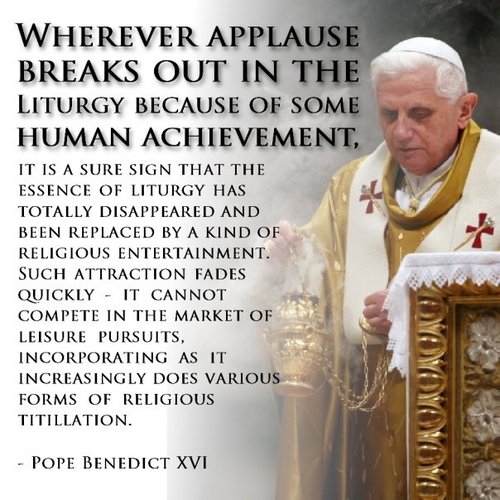Hat tip to Fr Guy Selvester at Shouts in the Piazza for posting this image. Indeed, the sacred Liturgy is worship of the Blessed Trinity not a time for introducing secular measures of approval and disapproval. I was at a priest friend's funeral today and after the homily was finished a member of the laity started the congregation in an applause. Not only was it out of place it bore no relation to the reality of the meaning of the Sacrifice of the Mass being celebrated by the Archbishop of Hartford (himself seemingly surprised yet he drew more attention to the fact that it happened). Not that my friend Father Brian didn't deserved some thoughtful acknowledgement for his extraordinary human and priestly qualities but at his Mass of Christian Burial applause was out of place. Paying attention to human sentiment and emotion is very important but there are appropriate times for external awareness. Something similar happened after a music piece was perforned earlier this week at a Mass which I attended for a friend's nephew who took his life. No doubt we were all feeling the rawness of emotion of a young man's suicide but is the Liturgy the place for secular displays of feeling. My friend Father Ambrose has fought for keeping applause out of the school Mass at St Louis Abbey's conventual Mass celebrated with the student body in attendance...
Pope Benedict XVI: July 2010 Archives
Even in the summer the Pope meets the faithful at the residence in Castel Gandolfo to give a brief reflection before praying the midday Angelus. He's on vacation so-to-speak, though he continues with meetings and writing and the like on a much reduced schedule. A paragraph from yesterday's address on vacation and God is noteworthy as many of us are now taking time off from work for leisure activities. The Pope emphasizes in his reflection that Christ is clear: the active life and hospitality are essential in discipleship but it is absolutely necessary to listen to the Word of the Lord. The heart of St Luke's narrative of the Martha & Mary event is that in "the Lord is there in that moment, present in the person of Jesus! Everything else will pass and will be taken away from us, but the Word of God is eternal and gives meaning to our daily activity."
And so, we have the heart of Benedict's message:

This Gospel passage [on Martha and Mary, Luke10:38-42] is very important at vacation time, because it recalls the fact that the human person must work, must involve himself in domestic and professional concerns, to be sure, but he has need of God before all else, who is the interior light of love and truth. Without love, even the most important activities lose value and do not bring joy. Without a profound meaning, everything we do is reduced to sterile and disordered activism. And who gives us love and truth if not Jesus Christ? So let us learn, brothers, to help each other, to cooperate, but first of all to choose together the better part, which is and will always be our greater good.
And so, we have the heart of Benedict's message:

This Gospel passage [on Martha and Mary, Luke10:38-42] is very important at vacation time, because it recalls the fact that the human person must work, must involve himself in domestic and professional concerns, to be sure, but he has need of God before all else, who is the interior light of love and truth. Without love, even the most important activities lose value and do not bring joy. Without a profound meaning, everything we do is reduced to sterile and disordered activism. And who gives us love and truth if not Jesus Christ? So let us learn, brothers, to help each other, to cooperate, but first of all to choose together the better part, which is and will always be our greater good.
Some may have heard the idea "the new liturgical movement" used nowadays to describe a recovery of the sacred Liturgy that understands a continuity in the Liturgy that has existed through the ages and not just made up by scholars and hacks. John Allen explores the origin of this idea according to the thinking of Pope Benedict in a brief NCR article, "What Benedict means by a 'new liturgical movement.'
I would also recommend the book referenced by John Allen, Milestones. It is necessary reading for all sorts of things, not just trying to understand Joseph Ratzinger.
We all are united with the Church under the guidance of the Pope, Benedict XVI, in praying for the following intentions in the month of July. The Pope entrusts us with these prayers hoping that all of us, united in faith, hope and charity, would be aware of the needs of Mother Church and the world when we offer our daily sacrifice of prayer to God.
The general intention
That elections in every nation may be carried out with justice, transparency, and honesty, respecting the free decisions of citizens.
The missionary intention
That Christians may strive to promote everywhere, but especially in our cities, education, justice, solidarity, and peace.


